Love and recycling in Seattle: Can your relationship survive the blue bin?

“What are the biggest recycling mistakes people make in Seattle? (And tend to argue about at home?)” That’s a common question we get as part of our KUOW Wonders series, which we re-launched this week.
T
o answer this question, we turned to Becca Fong, the residential recycling and composting outreach program manager at Seattle Public Utilities, who is also a quasi-family therapist.
"We are sometimes settling disputes within a household, you know, partners, parents and children, aunties and uncles,” Fong said.
People in her own life also reach out, she said. "I often get pictures texted to me, ‘Becca, is this recyclable? What do I do with this thing?’”
Seattleites are notoriously anxious about getting their recycling right. But that anxiety has an upside: We are crushing it.
Sponsored

“We have some of what we call the highest capture rates in the nation,” Fong said. “What that means is, of all the available material to be recycled, Seattleites recycle the most.”
Still, it can be tough to keep track of what can and cannot be recycled, especially with an abundance of single-use plastics and mixed-material packaging.
Fong said Seattleites can make their lives – and their relationships – easier by remembering the five key categories that go in the recycle bin: paper, cardboard, metals like aluminum and steel, glass, and rigid plastic. And don’t forget to make sure they’re empty, clean, and dry.
A lot of bits and bobs make their way through our homes, though, so that simple list may not cut it. If you’re looking to get more specific, Fong recommended checking the “Where Does It Go?” tool on Seattle Public Utilities’ website. That database includes information on what to do with everything from cardboard boxes to glitter and bowling balls.
Sponsored
(Think you know where your waste should go? Take our recycling quiz!)
For the love of recycling
L
ouise Sportelli, 66, is a lifelong Seattleite and lifelong recycler. She said her 86-year-old husband isn’t as diligent about where things go, however.
"I'm always plucking things out of the garbage if I see them and sticking them in recycle,” she said.
Sponsored
Sportelli’s husband has gotten better about recycling, she said, but it can be hard to keep up with all the materials they encounter – and the feeling that the extra effort may not be worth it.

“I think he cares, but he’s old enough it’s like, ‘It doesn’t really matter to me in the long run,’” Sportelli said.
We can sympathize with this feeling. After all, Seattleites aren’t just figuring out what goes in recycling – they're also computing what can go in their compost, and, if they’re ambitious, their Ridwell container. It’s not uncommon for Seattleites to have seven different receptacles to place their refuse in, so it’s no wonder this is causing stress and strife.
None of this fazes Deejah and Ron Sherman-Peterson, who are passionate climate activists. Deejah and Ron Sherman-Peterson share a love for each other – and for recycling.
Sponsored
“We've been together for over 52 years, and we're pretty much on the same wavelength,” Deejah said.

Deejah said too many people want to pin the responsibility on someone else, particularly the government, and don’t take enough personal responsibility for their trash. She saw for herself how problematic that can be.
The Sherman-Petersons took a tour of a recycling plant in Woodinville in 2019 with a group of KUOW listeners. They were among listeners who had sent in questions in years past to find out more about what can be recycled, where it ends up, and what gets in the way of getting the job done. For example, plastic grocery bags are a no-no because they jam up recycling machines.
Today, the Sherman-Petersons do their best but still have questions, like what to do with plastic plant pots or those envelopes with little plastic windows. (Our quiz answers that! Scroll down!)
Sponsored

Wish upon a recycling star
"W
hen in doubt, find out,” said Becca Fong with Seattle Public Utilities.
In other words: Don’t just toss something into the recycle bin if you’re not sure it belongs there. Recycling experts like Fong call that “wishcycling.”
“People are just hopeful. ‘If I put it in there, then it's going to get recycled. They'll sort it out in some way and find a way to use it again,’” she said.
Don’t be that person, she said.
If an item doesn’t fall into the five categories Fong mentioned – paper, cardboard, metals, glass, and rigid plastics – it could contaminate the rest of your recyclables.
The recycling industry is evolving, though.
Rick Vahl, president of the Washington State Recycling Association, said changes are underway to help the workers who collect recyclables identify mistakes.
Vahl said he’s excited to see how artificial intelligence could impact their work.

Consider this: You put a can of paint into your recycle bin, even though it cannot be recycled.
“As we dump the recycle containers into our truck, [artificial intelligence] can capture images, and it can identify the acceptable or unacceptable materials,” Vahl said. “And then, through GPS and other data points, it can communicate with that customer."
AI would give residents real-time data, he added, which the industry lacks today. With that information, service providers would be better equipped to correct mistakes immediately and, hopefully, in the long term.
“As we shape policy, find common ground, network, and share different experiences,” Vahl said, “I truly believe that Washington is and will continue to be one of the best recycling states in the U.S.”
Ready to do your part? Take our quiz to test your recycling knowledge!
(Having trouble seeing the news quiz? Hit refresh on your browser!)




